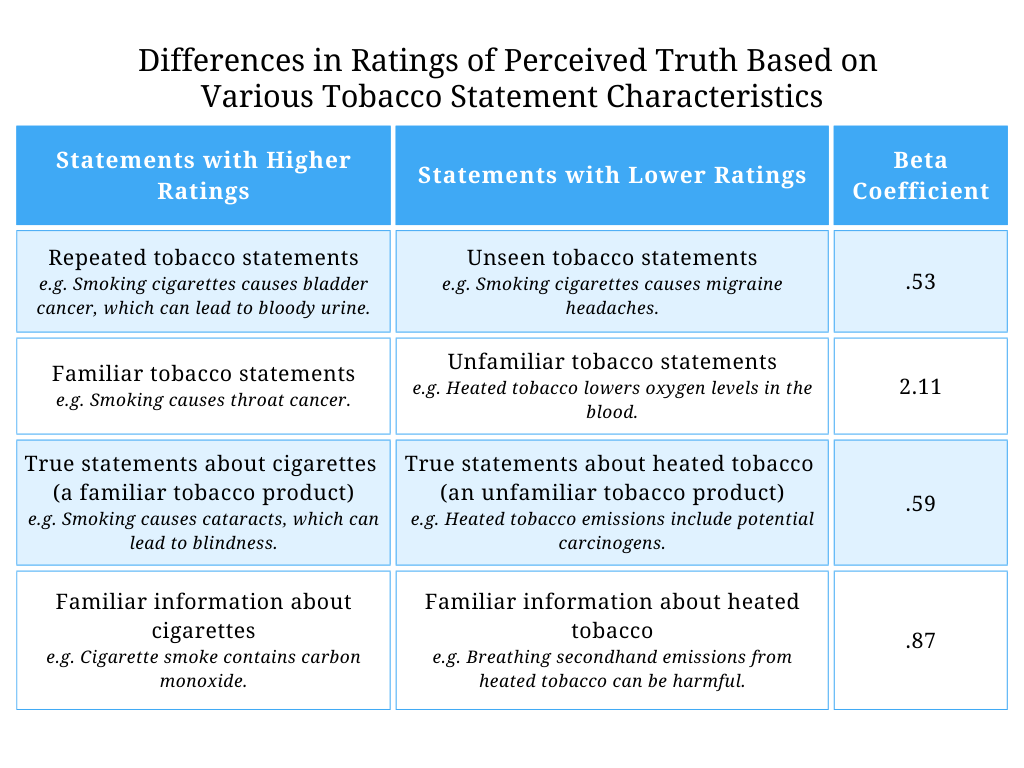Editor’s Note: Today’s review is part of our month-long Special Series on Addiction Myths and Misinformation. Throughout November, The BASIS is showcasing the dangers of myths and misinformation related to addiction.
Health misinformation negatively affects public health because it can create confusion, reduce trust in healthcare professionals, and prevent people from receiving appropriate care. This is particularly relevant for tobacco-related information because the tobacco industry has a history of misleading consumers, which prompts more positive attitudes towards smoking. It is also important to understand the effects of repetition on perceptions of misinformation, as individuals are more likely to believe information that they are repeatedly exposed to regardless of whether that information is true or false. This week, as part of our Special Series on Addiction Myths and Misinformation, ASHES reviews a study by Jennifer Morgan and Joseph Cappella that examined the effects of repetition on the perceived truth of tobacco misinformation among U.S. adults.
What were the research questions?
(1) Does repeated exposure to statements about tobacco products increase the perceived truthfulness of those claims? and (2) Do the effects of repetition differ for statements about an unfamiliar tobacco product (heated tobacco) compared to a familiar tobacco product (cigarettes)?
What did the researchers do?
The researchers recruited 1,436 U.S. adults aged 21+ from an online convenience sample. In an “exposure phase,” participants rated true and false statements about heated tobacco and cigarettes based on how interesting they perceived the statements. Afterwards, in a “testing phase,” participants rated the perceived truthfulness of the same statements and a new set of true and false statements about heated tobacco and cigarettes. The statements primarily consisted of anti-tobacco information. The researchers then used difference of means tests and mixed effects regression to compare ratings of perceived truth for the different types of tobacco statements.
What did they find?
Participants rated the perceived truth of repeated tobacco statements higher than tobacco statements that they had not previously seen in the exposure phase (see Figure). Additionally, participants rated the perceived truth of familiar tobacco statements (e.g., “Smoking causes throat cancer”) higher than unfamiliar tobacco statements (e.g., “Heated tobacco lowers iron levels in the blood”). Furthermore, they rated the perceived truth of true statements about cigarettes (a familiar tobacco product) higher than true statements about heated tobacco (an unfamiliar tobacco product). Similarly, they rated the perceived truth of familiar information about cigarettes higher than familiar information about heated tobacco.

Figure. This figure compares participant ratings of perceived truth based on different types of tobacco statement characteristics. For example, participants rated repeated tobacco statements higher on perceived truthfulness compared to unseen tobacco statements. Larger beta coefficients represent larger differences. All beta coefficients were statistically significant. Click image to enlarge.
Why do these findings matter?
It is important to monitor health misinformation related to tobacco use and quickly correct it due to the large amount of false and misleading information on social media and news platforms. This is especially true because people are more likely to believe information they are repeatedly exposed to. Thus, repeatedly exposing people to accurate but unfamiliar claims through public health campaigns is also crucial to increasing the perceived truthfulness of new health information and helping individuals make improvements in their health behaviors, such as smoking cessation.
Every study has limitations. What are the limitations in this study?
This study used an online convenience sample of primarily older and white U.S. adults, so the findings might not be generalizable to other age and racial groups. Additionally, participants’ ratings of tobacco statements could have been impacted by their preexisting knowledge and familiarity with tobacco-related information.
For more information:
SmokeFree offers tools and tips for quitting and maintaining abstinence from smoking tobacco. The Centers for Disease Control and Prevention also provides research and tips about cigarettes and how to quit. For additional self-help tools, please visit the BASIS Addiction Resources page.
— Annette Siu
What do you think? Please use the comment link below to provide feedback on this article.




